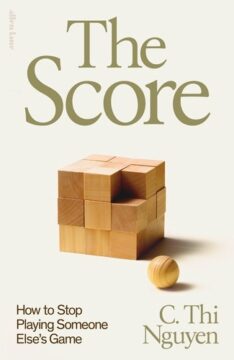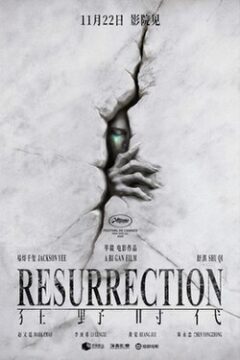James McWilliams at The Hedgehog Review:
 I had a book come out last July. It was about a dead poet and it led to many speaking engagements (be careful what you wish for). Nearly every weekend during the fall semester of 2025, I was on the road or in the air. Once, on the water.
I had a book come out last July. It was about a dead poet and it led to many speaking engagements (be careful what you wish for). Nearly every weekend during the fall semester of 2025, I was on the road or in the air. Once, on the water.
Typically, I spend my days monastically alone at my desk. But these trips took me to universities, book festivals, bookstores, public libraries, record shops, and music venues. Just as significantly: interstates, airports, hotels, motels, Ubers, taxis, restaurants, food trucks, gas stations, drug stores, grocery stores, bars, and diners. In other words, democratic spaces where American strangers encounter American strangers.
What I witnessed in these spaces alarmed me. Basic human interactions seemed poisoned. Instances of rudeness and aggression that I once thought rare were routine. People were noticeably hostile, inconsiderate, paranoid, jumpy, rushed, pissed, straight up mean. Most of the conflicts I witnessed were small, but they led to a big hypothesis: kindness is dying. Maybe it’s already dead.
More here.
Enjoying the content on 3QD? Help keep us going by donating now.

 An octopus’s adaptive camouflage has long inspired materials scientists looking to come up with new cloaking technologies. Now researchers have created a
An octopus’s adaptive camouflage has long inspired materials scientists looking to come up with new cloaking technologies. Now researchers have created a  T
T We often hear talk of things being good for our microbiome, and in turn, good for our
We often hear talk of things being good for our microbiome, and in turn, good for our  An awe-inspiring protest movement is shaking the foundations of power in Iran. Millions of people have taken to the streets to protest the corruption which has impoverished them, and the theocratic restrictions which have taken away their liberties. Men and especially women are standing up for their dignity and their livelihoods in the face of the deadly threat of state-sanctioned violence.
An awe-inspiring protest movement is shaking the foundations of power in Iran. Millions of people have taken to the streets to protest the corruption which has impoverished them, and the theocratic restrictions which have taken away their liberties. Men and especially women are standing up for their dignity and their livelihoods in the face of the deadly threat of state-sanctioned violence. Editor:
Editor: The unsettling operation of worms is something science realized a long time ago. Drawing on observations by Charles Darwin and Otto August Mangold, Jakob von Uexküll
The unsettling operation of worms is something science realized a long time ago. Drawing on observations by Charles Darwin and Otto August Mangold, Jakob von Uexküll  LAS VEGAS — Just beyond the flashing slot machines and cigarette-saturated casino air, thousands of the health obsessed gathered in a convention hall here to demonstrate their hacks for living longer lives. They infused ozone into their blood streams, stood on vibrating mats, swallowed samples of supplements and took scans of their livers.
LAS VEGAS — Just beyond the flashing slot machines and cigarette-saturated casino air, thousands of the health obsessed gathered in a convention hall here to demonstrate their hacks for living longer lives. They infused ozone into their blood streams, stood on vibrating mats, swallowed samples of supplements and took scans of their livers. In recent years, the vagus nerve has become an object of fascination, especially on social media. The vagal nerve fibers, which run from the brain to the abdomen, have been anointed by some influencers as the key to reducing anxiety, regulating the nervous system and helping the body to relax.
In recent years, the vagus nerve has become an object of fascination, especially on social media. The vagal nerve fibers, which run from the brain to the abdomen, have been anointed by some influencers as the key to reducing anxiety, regulating the nervous system and helping the body to relax. I had a book come out last July. It was about a dead poet and it led to many speaking engagements (be careful what you wish for). Nearly every weekend during the fall semester of 2025, I was on the road or in the air. Once, on the water.
I had a book come out last July. It was about a dead poet and it led to many speaking engagements (be careful what you wish for). Nearly every weekend during the fall semester of 2025, I was on the road or in the air. Once, on the water. I opened Claude Code and gave it the command: “Develop a web-based or software-based startup idea that will make me $1000 a month where you do all the work by generating the idea and implementing it. i shouldn’t have to do anything at all except run some program you give me once. it shouldn’t require any coding knowledge on my part, so make sure everything works well.” The AI asked me three multiple choice questions and decided that I should be selling sets of 500 prompts for professional users for $39. Without any further input, it then worked independently… FOR AN HOUR AND FOURTEEN MINUTES creating hundreds of code files and prompts. And then it gave me a single file to run that created and deployed a working website (filled with very sketchy fake marketing claims) that sold the promised 500 prompt set.
I opened Claude Code and gave it the command: “Develop a web-based or software-based startup idea that will make me $1000 a month where you do all the work by generating the idea and implementing it. i shouldn’t have to do anything at all except run some program you give me once. it shouldn’t require any coding knowledge on my part, so make sure everything works well.” The AI asked me three multiple choice questions and decided that I should be selling sets of 500 prompts for professional users for $39. Without any further input, it then worked independently… FOR AN HOUR AND FOURTEEN MINUTES creating hundreds of code files and prompts. And then it gave me a single file to run that created and deployed a working website (filled with very sketchy fake marketing claims) that sold the promised 500 prompt set.  It’s been twenty years since your exhibition at La Maison Rouge. That was my first encounter with your work and it also marked a radical turning-point for the photographer you were at the time. How do you see that exhibition today?
It’s been twenty years since your exhibition at La Maison Rouge. That was my first encounter with your work and it also marked a radical turning-point for the photographer you were at the time. How do you see that exhibition today? Films are rarely made in response to film critics, so it is unlikely that Bi Gan’s wildly ambitious new film was inspired Susan Sontag’s 1996 essay “The Decay of Cinema.” In any case, Bi was six years old, living in Kaili, China, when Sontag declared in The New York Times that “cinema’s 100 years seem to have the shape of a life cycle: an inevitable birth, the steady accumulation of glories and the onset in the last decade of an ignominious, irreversible decline.” “If cinema can be resurrected,” she concluded, “it will only be through the birth of a new kind of cine-love.” Yet Resurrection, as Bi’s film is called in English (its Chinese title is more like “Savage Age”—Bi has made a habit of giving his movies quite different titles in English and Chinese), seems conceived in exactly those terms. Its action spans that same century of movies, unified less by any continuity of plot than by the conviction that this era has come to an end. Cinema is dead. It may yet live again, but first: let us remember.
Films are rarely made in response to film critics, so it is unlikely that Bi Gan’s wildly ambitious new film was inspired Susan Sontag’s 1996 essay “The Decay of Cinema.” In any case, Bi was six years old, living in Kaili, China, when Sontag declared in The New York Times that “cinema’s 100 years seem to have the shape of a life cycle: an inevitable birth, the steady accumulation of glories and the onset in the last decade of an ignominious, irreversible decline.” “If cinema can be resurrected,” she concluded, “it will only be through the birth of a new kind of cine-love.” Yet Resurrection, as Bi’s film is called in English (its Chinese title is more like “Savage Age”—Bi has made a habit of giving his movies quite different titles in English and Chinese), seems conceived in exactly those terms. Its action spans that same century of movies, unified less by any continuity of plot than by the conviction that this era has come to an end. Cinema is dead. It may yet live again, but first: let us remember. In this circumstance, there is not so much a vacuum as a cloud of uncertainty. Everything is up in the air. Expectations, assumptions and intentions are scrambled. Fearing lost advantage in the face of these unknowns, worst-case scenarios drive the build-out of capabilities. Acting in the breach is a wild guess, the possible outcomes of which cannot be assuredly weighed.
In this circumstance, there is not so much a vacuum as a cloud of uncertainty. Everything is up in the air. Expectations, assumptions and intentions are scrambled. Fearing lost advantage in the face of these unknowns, worst-case scenarios drive the build-out of capabilities. Acting in the breach is a wild guess, the possible outcomes of which cannot be assuredly weighed.